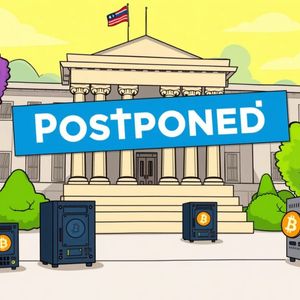BitcoinWorld Crucial Update: Powell on Labor Market Cooling and Economic Stability Federal Reserve Chair Jerome Powell recently delivered a crucial update that has many people talking about the economy. He confirmed that the labor market cooling trend is continuing, suggesting no significant shifts in the overall economic outlook. For anyone following the financial world, or simply wondering about their job prospects and the cost of living, understanding this development is key. What Exactly Does Labor Market Cooling Signify? When economists talk about the labor market cooling , they are not necessarily predicting a crash or widespread job losses. Instead, it typically refers to a moderation in the pace of hiring and wage growth. Think of it like a car engine that’s been running hot and is now settling into a more sustainable operating temperature. This cooling period often involves: A slower rate of job creation compared to previous periods of rapid expansion. Fewer job openings relative to the number of available workers. More moderate wage increases, which can help ease inflationary pressures. It’s a balancing act. The Fed aims for an economy where demand for labor aligns more closely with supply, preventing overheating without triggering a recession. Why Are We Seeing This Labor Market Cooling Trend? Several factors contribute to the current state of the labor market cooling . The Federal Reserve’s consistent interest rate hikes over the past year have played a significant role. Higher borrowing costs for businesses can lead to reduced expansion plans and, consequently, slower hiring. Moreover, the economy is adjusting after a period of intense post-pandemic growth. Supply chains have largely normalized, and consumer spending patterns are shifting. Businesses are becoming more cautious, leading to a more measured approach to staffing. This natural economic cycle helps to bring stability. How Does This Labor Market Cooling Impact Your Daily Life? The gradual labor market cooling can have various implications for individuals and businesses. On one hand, it might mean slightly less competition for certain jobs, but also potentially longer job searches for others. Wage growth may not be as robust as it once was, which could affect household budgets. However, there’s a positive side too. A cooling labor market often contributes to lower inflation. When wage growth moderates, businesses face less pressure to raise prices, which can eventually lead to more stable costs for goods and services. This could mean your money goes further in the long run. For investors, this economic signal from Powell suggests the Fed might be nearing the end of its tightening cycle, which could influence market sentiment and investment strategies. Navigating the Evolving Landscape of Labor Market Cooling Understanding these shifts is crucial for making informed decisions. Here are some actionable insights: For Job Seekers: Focus on skill development and networking. Tailor your applications carefully and highlight unique contributions. For Employees: Continuously evaluate your value proposition at work. Consider upskilling or cross-training to remain adaptable. For Businesses: Prioritize efficiency and strategic hiring. Invest in employee retention and development to maintain a strong workforce. For Consumers: Continue to budget wisely and monitor inflation trends. A cooling market doesn’t mean an end to price pressures immediately. This measured approach from the Fed aims to achieve a “soft landing” – bringing inflation down without causing a severe economic downturn. The gradual nature of the labor market cooling gives both individuals and businesses time to adapt. In Summary: Federal Reserve Chair Jerome Powell’s recent comments confirm that the labor market cooling is a measured process, not a sudden collapse. This gradual shift aims to stabilize the economy and curb inflation, offering both challenges and opportunities. By staying informed and adaptable, you can navigate these economic changes effectively and plan for a more stable future. Frequently Asked Questions (FAQs) Q1: Is labor market cooling the same as a recession? A1: Not necessarily. Labor market cooling refers to a moderation in growth, while a recession involves a significant decline in economic activity, including widespread job losses. The Fed aims for cooling to prevent a recession. Q2: How long is this labor market cooling expected to last? A2: The duration of economic trends is difficult to predict precisely. The Fed will continue to monitor data and adjust policies as needed, but a gradual return to more balanced conditions is the goal. Q3: Will this affect my current job security? A3: While a cooling market can mean less aggressive hiring, it doesn’t automatically imply job insecurity for existing employees. Companies often prioritize retaining skilled workers. Focus on performance and adaptability. Q4: What does this mean for interest rates? A4: A gradually cooling labor market, combined with other economic data, might give the Federal Reserve more reason to pause or slow down future interest rate hikes, though this is not guaranteed. Q5: Should I adjust my investment strategy due to labor market cooling ? A5: It’s always wise to review your investment strategy in light of economic shifts. Consider consulting a financial advisor to understand how these trends might impact your specific portfolio goals. If you found this article insightful, please consider sharing it with your network! Your support helps us provide more timely and relevant economic updates. To learn more about the latest explore our article on key developments shaping the global economy’s future outlook. This post Crucial Update: Powell on Labor Market Cooling and Economic Stability first appeared on BitcoinWorld .















